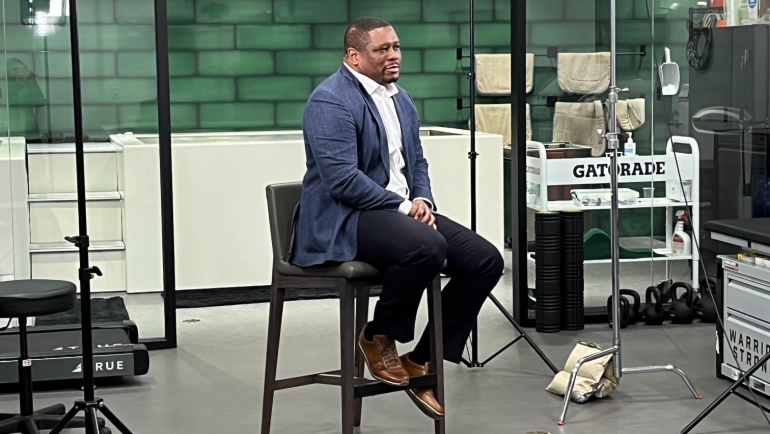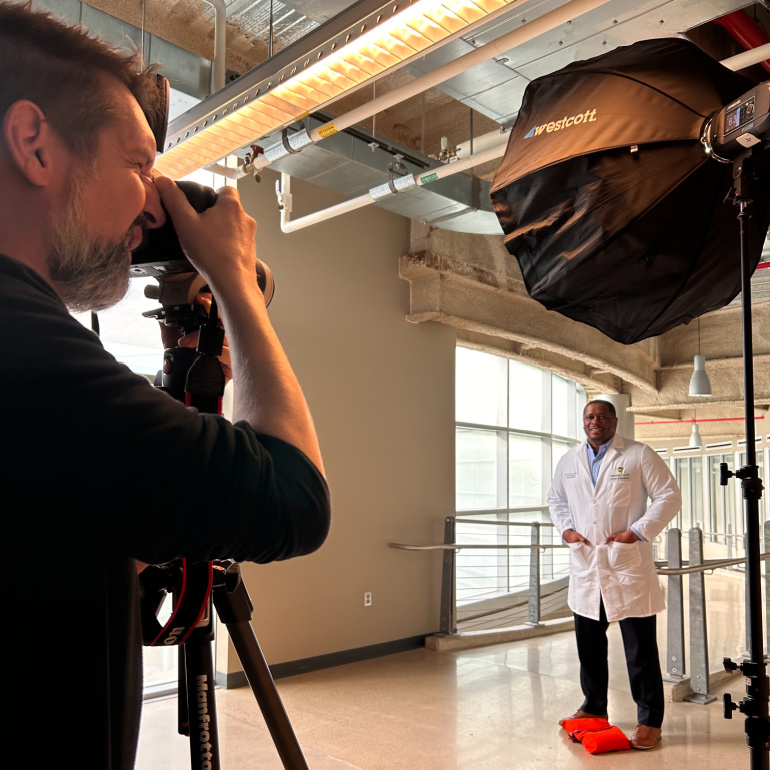
When Dr. Teronto Robinson graduated from Wayne State University School of Medicine, he had to decide where he wanted to practice medicine. Robinson admitted it was a tough decision, but he chose to work at Veterans Affairs in Detroit because it fits many of the things he wanted to pursue as a doctor while honoring those in his family who served.
“I always thought I was a people person,” Robinson said. “I always wanted to give back and help my community. My family has plenty of members who serve in the military, so when I had to decide whether to work for the VA or go into the private sector, I chose the VA to continue to serve. It is one of the things that the School of Medicine teaches you: to give back and serve your community.”
Robinson has uncles, great-uncles and cousins who served in the military, including an uncle who served in Vietnam and died a few years ago from Agent Orange exposure and a great-uncle who was military police officer in World War II. He said he treats his patients at the VA like they are his family.
“I enjoy working with veterans,” Robinson said. “I see patients who served in Vietnam to those who served recently in Iraq and Afghanistan. The whole reason I went into medicine was to help people. I did not serve in the military, but I serve in a different capacity as a physician for our veterans. My family served, and this is my opportunity to serve.”
Robinson enjoys helping his patients but noted that the most rewarding aspect can be unexpected.
“Sometimes, helping people is not necessarily just patient care,” he said. “It is helping someone find the right clinic or specialist, or calling someone to let them know we got that scooter they were waiting to receive. That is the most important thing, which makes me feel good — helping someone achieve what they need.”

Growing up in Ecorse, Robinson came from humble beginnings but always dreamed big. He earned a bachelor of arts in biology from Wayne State before attending medical school.
“The passion for becoming a physician was always there,” said Robinson, who took two years off after earning his bachelor’s to prepare for the MCAT. During that time, he was a substitute teacher for Ecorse Public Schools, an experience that helped him prepare for the exam.
“I always felt confident that I would do well on the MCAT,” Robinson said. “Wayne State University Medical School gives you tremendous support. They have counselors that worked with me and other medical students on how to prepare for the USMLE STEP 1 test, and the counselors are incredibly supportive as you matriculate through medical school.”
Robinson, who joined the School of Medicine’s Post Baccalaureate Program for first-generation college graduates, noted that medical school is difficult, but there were never any moments where he felt like he did not belong.
“It's about being disciplined,” he said. “If you can set and maintain a schedule throughout the day, you will succeed. I had enormous support from the Wayne State School of Medicine faculty. I also participated in the Black Medical Association, a group of students that are not only Black medical students but are also of different ethnicities that support each other. I also participated in ‘Cold Blue’ as a medical student, which is a service organization.”
Robinson considers Wayne State part of his extended family, providing support when he needed it. He is currenlty a member of the Medical Alumni Association Board of Governors.
“The admissions office, faculty, counselors and administrators — they were all there for me when I needed something,” he said. “There was never a time when I reached out to the faculty with a question and they did not get back to me immediately. Wayne State is an environment where they make you feel like if you win, they do too. I do not have enough good things to say about Wayne State.”
Robinson also enjoyed giving back to the community while at the School of Medicine.
“You have a lot of different programs where you can do outreach: You can do Reach Out to Youth, which focuses on exposing students to careers in medicine, or go to a homeless shelter to work during Thanksgiving,” Robinson said. “In medical school, we went to homeless shelters such as the Cass Clinic to provide basic health screenings. Wayne State is incredibly supportive of your ideas as a student, and as a physician today, if you want to do something with the medical school, you can come back and be a part of it.”
Robinson — who is part of a new billboard campaign across metro Detroit that celebrates the success that many recent Wayne State University graduates have found in the workforce — said he would encourage anyone considering medical school to consider Wayne State University School of Medicine.
“If you want a family atmosphere, you want to support and access to great faculty, then you shouldn’t overlook Wayne State,” he said. “Wayne State always picks up the phone and supports your goals and dreams. That is what happened to me.”

